- Home
- Darrell Maloney
An Acquired Taste Page 14
An Acquired Taste Read online
Page 14
Something to shout from the mountaintops.
Quite possibly the biggest step forward in her life, and something to be immensely proud of.
And she might have been.
If she wasn’t absolutely terrified.
It wasn’t so bad during the daytime.
Wherever she went, Hero was by her side. Never threatening, always ready to defend her if she was challenged and to stand guard over her if she went down again.
The medicine she carried in her backpack now should prevent that from recurring. But she got the sense if it ever did she’d wake up safe and sound to the sensation of dog slobber on her cheek, just as she had before.
No, it was the nights which were the hardest.
She couldn’t bring herself to invite Hero into the sleeper cab with her.
She knew she owed it to him, to provide him shelter from the night and all the horrors it brought with it.
But she just couldn’t.
For despite the sense that Hero would protect her if she ever passed out, her nightly sleep was a different matter.
It was at night when the terrors had always come, going back as far as she could remember.
It was at night when she’d wake up in a cold sweat after dreaming the dogs were after her; then lay awake staring at the ceiling too afraid to go back to sleep.
The nightmares had intensified after she met Hero. Had become much more vivid.
Actually, nightmares was the wrong term. For it was only one.
One single nightmare, repeated night and night again, sometimes more than once a night.
All her life she’d been terrified of dogs, although she personally couldn’t recall the attack which made her that way.
All her life she’d generalized the threat. All dogs were dangerous. All dogs were trying to kill her, from the biggest mastiff to the smallest Chihuahua. Even puppies, as sweet and cuddly as they were to everyone else she knew, were a source of great fear.
For they too, despite their precocity, would someday want to tear her apart.
Something was different this time, although it took her some time to figure out exactly what it was. What triggered the terrors this time was that the threat was no longer generic. No longer generalized.
Now, for the first time in her life, her terror had a face.
The face of Hero.
The dream always started out the same way.
It took place in the daytime, as she walked along the highway.
And it started out with a growl.
Hero’s growl.
She always froze. Not because she wanted to, but because she was paralyzed.
She was defenseless as she dropped to her knees.
Hero started circling her. Eyeing her. Daring her to run.
Once, twice, three times he’d walk around her, getting closer each time.
Finally, on his fourth pass, he’d suddenly charge.
He’d go for her throat, and would knock her backwards as he sunk his teeth deep inside her.
If it were reality, it would be at that moment she’d likely pass out.
But bad dreams, even nightmares, typically showed mercy in that they awoke someone at the worst part of the dream.
It was invariably that moment when Tillie opened her eyes, screaming in terror and covered with sweat.
Each time she did so Hero lifted his head from his post beneath the big tractor. He whimpered a bit, knowing his human was in distress, and was perhaps a bit sad there was nothing he could do to help her.
He didn’t understand what was bothering her to be sure. Had no way of knowing how to fix it, but desperately wanting to.
Had no way of knowing he was the root of the terrors.
Had he known it was his appearance two weeks before that was causing her terrors he likely would have just walked away.
For he certainly didn’t want to cause her any pain or fear.
Hero had felt an instant attachment to Tillie. He couldn’t understand it, no more than she could.
But now that they were together he’d be her protector and best friend.
Even if she couldn’t see it yet.
Each time the nightmare woke her up she cried. She knew in her heart it wasn’t real. But in the moment it had seemed so.
Even though she’d had the same dream two dozen times it was just as terrifying, just as real, as the very first time. One would think she’d have grown used to it by now. That it would be like a rerun she’d seen a thousand times on television.
That it would have become less fearful.
But that wasn’t the case.
That was what Tillie’s life had become.
An endless series of terrors and discomforts.
-39-
It wasn’t that she wasn’t trying.
She talked to Hero constantly as they walked along the highway.
She wanted to convey to him that she trusted him. That she thought of him as a friend.
If she were to be honest with herself though, she’d have had to admit most of the chatter was to calm her own nerves.
She even found herself petting him more and more often now, when they took their breaks and sat together in the shade of a truck or beneath a tree.
In her heart of hearts she knew that no one was to blame for her irrational fear.
Not even the dog who’d attacked her when she was a baby. For he’d been abused himself and had his own demons to deal with.
She wasn’t to blame for her terrors.
Hero certainly wasn’t to blame.
It was what it was, as simple as that. And she knew she’d get over it in time.
She got the sense Hero was in it for the long haul. That he’d be patient with her for as long as it took.
She got the sense he somehow knew she wasn’t to blame for the way she was.
On a beautiful afternoon after a passing shower the pair had stopped to hunt for rabbits.
Tillie’s father Troy used to say, when he was in the mood for a certain type of food, “I’ve got a powerful hankerin’ for chicken.” Or steak, or tacos, or whatever.
The phrase always made Tillie smile, sometimes even giggle, when she was young.
He didn’t say it to entertain her. It was just the way people talked when he’d been her age, and he’d adopted it himself.
Now, after he’d been gone for many years, she found herself saying it occasionally.
It was more nostalgic than humorous now, though it brought a smile to her face nonetheless. It was one of the few things she had left from her dear departed daddy.
That and his baby blue eyes.
“Come on, Hero,” she’d said as she led him into a meadow off the highway. “I have a real powerful hankerin’ for some rabbit.”
She looked down at him as she said it, and she saw something on the big dog’s face.
Almost a look of understanding. Or perhaps recognition described it best.
She wasn’t sure what it was, exactly. Just something…
The trouble was, the rabbit gods weren’t smiling down on Tillie this particular day.
After an hour, she still hadn’t spotted a single rabbit to shoot at.
After an hour and a half she started to get drowsy.
In late afternoon, not long before sunset, she awoke.
She hadn’t even been aware she’d dozed off.
She might have been startled, but she wasn’t.
She was comforted by the slow and steady breathing of the big furry pillow beneath her head.
Her head rose and fell with each of Hero’s breaths.
Something was different.
She felt she’d turned a corner.
She couldn’t’ understand how or why, but she got the sense her father had sent her a message from the great beyond.
Was that possible? That her long-dead father could send her message through the expression on a dog’s face?
No, it couldn’t be. That would defy all logic.
Yet h
ere she was, lying comfortably on an animal she was frightened to death of not long before.
And she felt safe.
More than safe.
She felt as snug as a newborn baby in her mother’s arms.
She wrapped her arm around her friend and allowed herself to doze again.
She awoke just in time to see the last bits of the sun, just as it dipped beyond the horizon.
“Come on, boy. We need to find a bunk for the night.”
They didn’t have to look far.
There was an available sleeper cab just a tenth of a mile up the highway.
Once there, Tillie climbed aboard and Hero took his usual place on the pavement beneath the hatch.
That was unacceptable. Never before, but now.
Tillie patted the floor of the sleeper and said, “Come on, boy. Can you make it up here?”
Indeed he could, and indeed he did.
It would be the first night of many, of their new sleeping arrangement. She on the trucker’s tiny bunk, he on the floor beside her.
And they both slept so much better knowing the other was close by and safe.
- 40-
John Castro had a hunch.
Actually he had two. The first was that Lamar Taylor, AKA Big Boi, murdered three helpless elderly women so he could obtain their daily food rations from the city. Perhaps for himself, perhaps for his friends.
It didn’t matter which. Either option was just as heinous.
His other hunch was that other people were doing the same thing. That maybe Big Boi had bragged about his scam to his friends, who went out and murdered their own innocents so they could do the same thing.
Or, more likely, it was the other way around.
More likely Big Boi got the idea from someone else.
After all, from everything John had heard about Lamar “Big Boi” Taylor, he was as dumb as a rock. Certainly not smart enough to come up with such a scam on his own.
The bigger picture, the possibility the practice was widespread, would have to go on the back burner. As talented and driven as John Castro was, he could only work one case at a time.
He would consider the Rhett Butler assault case closed. Lamar Taylor was the only suspect they had. His were the only prints found. Taking him alive was the only chance they had of obtaining the identities of his two accomplices.
But it didn’t work out that way. He chose to go out in a blaze of glory.
That was fine in some respects. It was far less paperwork at a time when nobody in the SAPD had time to do any. It saved a lot of trouble for a justice system that was operating on an extremely limited capacity.
And it did away with the possibility he’d be let off by a judge because of insufficient evidence or sloppy evidence gathering techniques.
The down side was that the two accomplices would likely never to be called to account for their roles in the brutal beating.
But that wasn’t unusual. Even before the blackout, when everything ran normally, criminals got away with most of their crimes. Justice Department studies revealed not long before the lights went out some very troubling statistics:
Burglars seldom did time for their very first burglary. They typically committed fifteen to twenty burglaries before they got caught.
The same was true across the spectrum of criminal activities, from armed robberies to sexual assaults to rapists.
The only bright spot was murder, where most killers who were caught were caught after their first murder. Of course, that fact was tempered by the knowledge that over sixty percent of murders went unsolved.
John, and every other member of the blue fraternity, had to resolve themselves to the fact that the majority of crimes went unpunished.
The best John could hope for regarding Rhett’s other attackers was to hope they eventually got nabbed for breaking another law.
Or, even better, that they got culled from the herd of thugs they ran with by pissing off the wrong person and being rewarded with a bullet to the head.
In any case, John had to close the book on the Rhett Butler case and move on.
And that meant he had to find Rose McGlory and Mary Graves.
Mary lived, according to her driver’s license, on East Quincy.
East Quincy ran alongside Interstate 37, which cut a path through the downtown area. He was familiar with the street because one of his college buddies once lived there.
The college buddy was long gone now, having lost his life in Iraq. But the house was still there.
John stood outside it for several moments, recalling the late night poker games, the parties, the pranks.
Then, the welcome break from reality the nostalgia brought was over. He turned and walked two blocks farther to Mary Graves’ house.
It had been built in the 1930s and once would have been considered regal. By the time of the blackout it had seen its glory days pass it by and was in disarray.
Now, after two plus years of having no maintenance done on it at all, it was nearing a new stage of its life.
A ramshackle stage.
He was relieved, as he climbed the steps to the house, that he didn’t smell the tell-tale stench of a body decomposing inside.
Perhaps the woman was inside napping or reading.
Perhaps she’d just been unfortunate enough to have lost her driver’s license while gathering food.
Perhaps Big Boi just happened upon it.
Perhaps. But not likely.
He knocked and waited.
There was no answer. But he wasn’t disheartened; not just yet.
It wasn’t uncommon for people to avoid opening their doors to strangers.
Especially single women.
And especially when the visitor was an armed man.
He knocked a second time, while reaching into his pocket.
He withdrew what appeared to be a man’s wallet, but was actually a badge holder.
It opened, as a wallet would, but held no money or credit cards.
It held his SAPD badge on one side and his official police identification card on the other.
He held it as he knocked a third time, ready to present it to the nervous woman when she finally answered.
But she never did.
-41-
“Ahoy, there, Matey!”
John turned, a bit curious about the nautical greeting.
An old man was walking across the yard toward him, wearing a blue ball cap with the words:
USS CONSTELLATION
CV-64
Greeting understood.
John loved Navy veterans. All branches of the military were part of the same brotherhood, but the Navy shared a special kinship with the United States Marine Corps.
“Hello, sir,” John said as he reached out his hand.
“Hello, officer,” the man responded.
John was beginning to think the whole city pegged him as a cop, just from the way he carried himself and cut his hair.
But he wasn’t offended. Not at all.
“I’m John Castro. Deputy Chief of Police.”
“Dan Gray. I’m Mary’s next door neighbor. If you’re looking for her, I’m afraid she’s gone.”
“Yes indeed I am looking for her,” John said. “Any idea when she’ll be back?”
The old man’s face turned grim.
“No. I mean gone as in deceased.”
He seemed ready to shed a tear. John got the sense he’d been close to the woman.
“I’m terribly sorry,” John said. “Can you tell me what happened?”
“Not much to tell, really. She lived alone. Fiercely independent, she was. My wife and I offered to let her move in with us, and a couple of the other neighbors did as well. She always refused, insisting she could take care of herself.
“Only apparently she couldn’t. Helen and I got into the habit of going by there every two or three days to check up on her and see if she needed anything.
“A week or so ago there was no answer at the do
or. I climbed over the fence and found her patio door shattered.
“She was in the kitchen in a huge puddle of blood. Stabbed more times than I dare count. I only hope she died quickly, and that the animals who did it get sent to hell just as quickly.”
John nodded in agreement, then asked, “Is she still in there?”
“No sir, Helen and I took turns. It took a couple of hours, but we were able to dig her a shallow grave. She’s buried in her back yard, right next to her favorite cats. We thought she’d like it there.”
“Thank you for doing that for her. Do you know of anyone who would have done that to her?”
“No sir. But there are people coming through here all the time, peeking in windows, banging on doors, going into the vacant homes to search through them. That’s what they did to her home. Tore it apart, looking for whatever they thought her life was worth.
“Any idea what was taken?”
“No, sir. She always kept a neat house, and now it’s a nightmare. We cleaned her blood from the kitchen floor, out of respect for her. But it was just too much of a mess for us to try to clean it all.”
“Mind if I go in and look around?”
“I don’t have the right to grant that request. But I’m pretty sure Mary would allow it. I hope you can get some clues on who did this and bring them to justice.”
John tried the front door and was surprised to find it unlocked.
He looked back at Dan, who shrugged and said, “Didn’t seem to be any reason to lock it anymore.”
“Good point.”
As John walked through the house he tried to imagine what it once looked like. If Mary was, as the man said, a neat housekeeper she’d have been devastated to see it in its current condition.
It was as though someone had gone through the house raking everything from the shelves, picking up lamps and throwing them across the room, tossing pieces of furniture.
There was also a lingering smell of death.
That would last for many months, alerting anyone and everyone who walked through the door this was a place where a death occurred.
There were tens of thousands of homes in the city which shared that grim distinction.
-42-

 A Perilous Journey
A Perilous Journey The Yellowstone Event: Book 6: The Aftermath
The Yellowstone Event: Book 6: The Aftermath Eden Bound
Eden Bound Without Warning
Without Warning Everything Has Changed
Everything Has Changed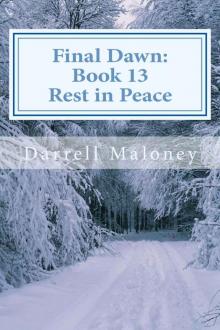 Rest in Peace
Rest in Peace This Changes Everything
This Changes Everything The Final Chapter
The Final Chapter It Can't Be Her
It Can't Be Her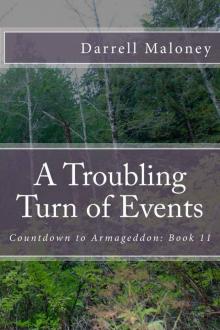 A Troubling Turn of Events
A Troubling Turn of Events The Blockade
The Blockade A Tearful Reunion
A Tearful Reunion Countdown to Armageddon
Countdown to Armageddon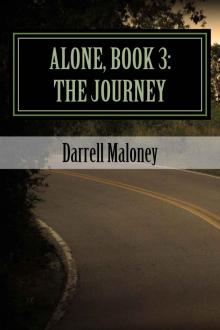 Alone, Book 3: The Journey
Alone, Book 3: The Journey The Army Comes Calling
The Army Comes Calling The Grim Reaper Comes Calling
The Grim Reaper Comes Calling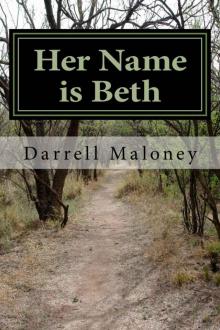 Her Name is Beth: Alone: Book 5
Her Name is Beth: Alone: Book 5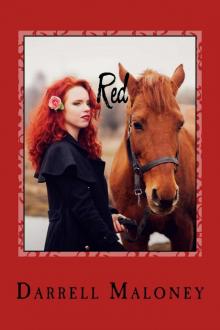 Red: The Adventure Begins
Red: The Adventure Begins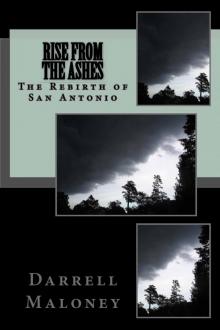 Rise From The Ashes: The Rebirth of San Antonio (Countdown to Armageddon Book 3)
Rise From The Ashes: The Rebirth of San Antonio (Countdown to Armageddon Book 3)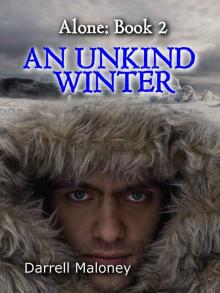 An Unkind Winter (Alone Book 2)
An Unkind Winter (Alone Book 2)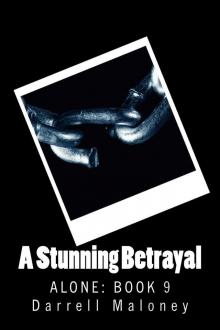 A Stunning Betrayal: Alone: Book 9
A Stunning Betrayal: Alone: Book 9 A Whole New World: Ranger: Book 2
A Whole New World: Ranger: Book 2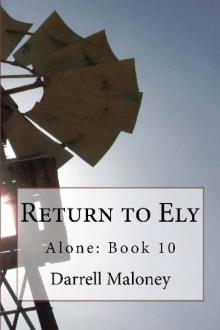 Return To Ely
Return To Ely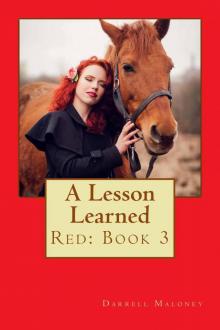 A Lesson Learned: Red: Book 3
A Lesson Learned: Red: Book 3 The Homecoming: Countdown to Armageddon: Book 5
The Homecoming: Countdown to Armageddon: Book 5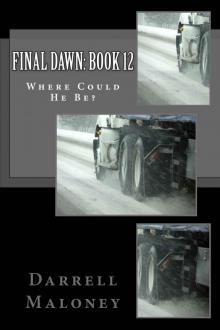 Final Dawn: Book 12: Where Could He Be?
Final Dawn: Book 12: Where Could He Be? An Acquired Taste
An Acquired Taste On Desert Sands: Alone: Book 6
On Desert Sands: Alone: Book 6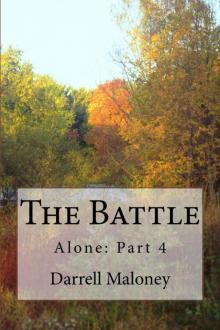 The Battle: Alone: Book 4
The Battle: Alone: Book 4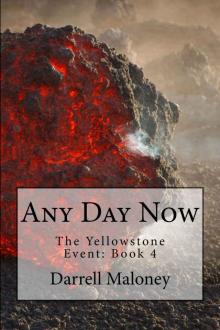 Any Day Now
Any Day Now Too Tough To Tame: Red: Book 2
Too Tough To Tame: Red: Book 2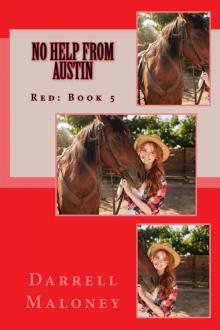 No Help From Austin: Red: Book 5
No Help From Austin: Red: Book 5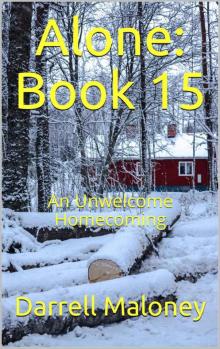 An Unwelcome Homecoming
An Unwelcome Homecoming A New Start: Final Dawn: Book 9 (Volume 9)
A New Start: Final Dawn: Book 9 (Volume 9)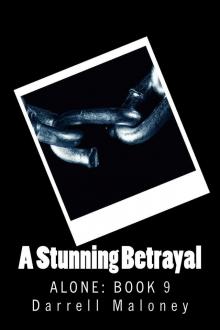 A Stunning Betrayal
A Stunning Betrayal An Undeclared War (Countdown to Armageddon Book 4)
An Undeclared War (Countdown to Armageddon Book 4) One of Our Own: Final Dawn: Book 11
One of Our Own: Final Dawn: Book 11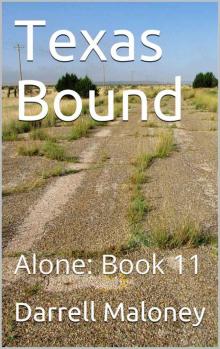 Texas Bound: Alone: Book 11
Texas Bound: Alone: Book 11 Payback: Alone: Book 7
Payback: Alone: Book 7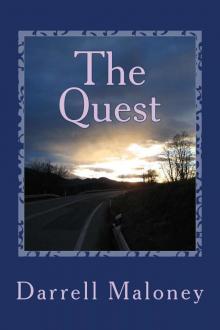 The Quest: Countdown to Armageddon: Book 6
The Quest: Countdown to Armageddon: Book 6 The Siege
The Siege The Yellowstone Event: Book 1: Fire in the Sky
The Yellowstone Event: Book 1: Fire in the Sky Return to Blanco (Red Book 4)
Return to Blanco (Red Book 4) The Search
The Search AFTER THE DUST SETTLED (Countdown to Armageddon Book 2)
AFTER THE DUST SETTLED (Countdown to Armageddon Book 2)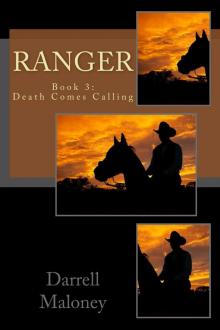 Death Comes Calling (Ranger Book 3)
Death Comes Calling (Ranger Book 3)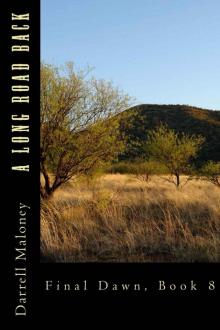 A Long Road Back: Final Dawn: Book 8
A Long Road Back: Final Dawn: Book 8